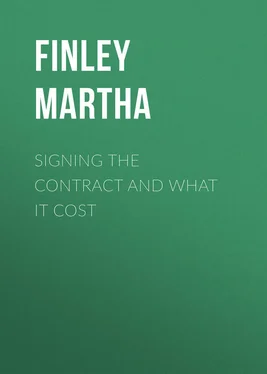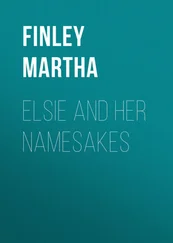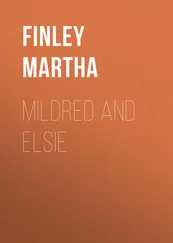Martha Finley - Signing the Contract and What it Cost
Здесь есть возможность читать онлайн «Martha Finley - Signing the Contract and What it Cost» — ознакомительный отрывок электронной книги совершенно бесплатно, а после прочтения отрывка купить полную версию. В некоторых случаях можно слушать аудио, скачать через торрент в формате fb2 и присутствует краткое содержание. Жанр: foreign_antique, foreign_prose, на английском языке. Описание произведения, (предисловие) а так же отзывы посетителей доступны на портале библиотеки ЛибКат.
- Название:Signing the Contract and What it Cost
- Автор:
- Жанр:
- Год:неизвестен
- ISBN:нет данных
- Рейтинг книги:3 / 5. Голосов: 1
-
Избранное:Добавить в избранное
- Отзывы:
-
Ваша оценка:
- 60
- 1
- 2
- 3
- 4
- 5
Signing the Contract and What it Cost: краткое содержание, описание и аннотация
Предлагаем к чтению аннотацию, описание, краткое содержание или предисловие (зависит от того, что написал сам автор книги «Signing the Contract and What it Cost»). Если вы не нашли необходимую информацию о книге — напишите в комментариях, мы постараемся отыскать её.
Signing the Contract and What it Cost — читать онлайн ознакомительный отрывок
Ниже представлен текст книги, разбитый по страницам. Система сохранения места последней прочитанной страницы, позволяет с удобством читать онлайн бесплатно книгу «Signing the Contract and What it Cost», без необходимости каждый раз заново искать на чём Вы остановились. Поставьте закладку, и сможете в любой момент перейти на страницу, на которой закончили чтение.
Интервал:
Закладка:
“Wait, my dear, till you have heard her story,” said the old gentleman. “We don’t know how she may have been deceived and betrayed.”
A few days later Rolfe came to his mother with an explanation which even in her eyes exculpated Ethel.
“Ah, well, poor thing! she’s had a hard time of it,” said the old lady, wiping away a tear. “And I hope, Rolfe, if she falls into your hands you’ll try to make it up to her.”
“I shall indeed,” he said, with a peculiar and very happy smile. “Come, mother, come to her room with me. The minister is there, my father and Ada too, and Ethel and I are now to be made one for life.”
“Rolfe!” she cried in astonishment.
“Yes, mother; I cannot let her feel herself alone in the wide world any longer, and I must have the right to nurse her back to health. You will not withhold your consent, mother dear?”
“No,” she said, with a half-bewildered look as she accepted the support of his offered arm, “not if it is to make you and that poor young thing happy; but it is very sudden.”
CHAPTER IV
A STRANGE REVELATION
“The web of our life is of a mingled
Yarn, good and all together.” —
For a few days the little Ethel was quite inconsolable, crying sadly for “Mamma;” but the new parents were very tender, patient, and affectionate, and the old love gradually faded from the baby memory, till at length it was utterly forgotten in the new. So also was the name her true mother had given her, Mrs. Kemper changing it to Florence, which she liked better.
Anxious that the child should believe herself their own by birth, the Kempers considered it fortunate that it was while journeying to a new home in the West, among strangers, in the little town of Cranley, that they obtained possession of her.
They breathed no hint of the little one’s history, and none of their new acquaintances had the least suspicion of the truth, as indeed how should they when to both parents “our little Floy” was evidently as the apple of the eye?
So loved and cared for, and blessed with a sweet, generous, affectionate disposition, hers was a bright, sunny childhood. She was spared even the loneliness of many an only child, finding companion, playmate, and friend in the little son of the nearest neighbor.
The grounds of the Aldens and Kempers adjoined, and immediately upon the arrival of the latter, friendly relations were established between the two families. Mrs. Alden called upon her new neighbors, taking with her her five-year-old Espy, a flaxen-haired, blue-eyed boy, who straightway fell in love with the lustrous, laughing brown orbs and dark curls of baby Floy.
She sat on a cushion by the side of her new mamma, daintily habited in white, a gold chain about her neck, knots of blue ribbon at her shoulders, and a wide sash of the same at her waist. The plump little arms hugged close to her bosom a doll half as large as herself, while the sweet baby voice sang cheerily, “Bye, baby, bye!”
“What’s your name?” asked Espy, regarding her with admiring eyes.
“Florence,” answered Mrs. Kemper quickly, “but we call her Floy for short.”
“That’s a pretty name, and you’re a pretty baby,” he said, giving her a kiss. “Nex’ time I come I’ll bring my kitten. She’s a nice cat, and I love her; but I’ll just give her to you, if you want her.”
“I was never more surprised,” remarked Mrs. Alden in an aside to Mrs. Kemper. “He prizes that kitten above all his other possessions.”
And thus it ever was from that first moment. Nothing could be, in Espy’s esteem, too good, beautiful, or precious to be given to Floy – “his little wife,” as he began to call her before she was three years old, challenging a special proprietorship in her with which no other boy was allowed to interfere.
A day seldom passed in which he did not present some offering at her shrine, though it were no more than a sweet-scented clover-blossom or a brightly-tinted autumn leaf.
They shared each other’s joys and sorrows: all her little griefs were confided to him; to her he recounted all his boyish dreams of future achievement when he should arrive at man’s estate.
He was a born artist, and found in Floy his chief inspiration; for while his parents and older brothers and sisters laughed at and discouraged him, she believed thoroughly in him, and was sure he would some day be a Rubens, a Raphael, a Michael Angelo, or something even greater than any of them or all put together; and her graceful little figure and winsome face furnished him with a model that he was never weary of copying.
Mr. Alden, hoping that this son would embrace one of the learned professions, determined to give him a liberal education; and the first great grief either Floy or Espy had known was the parting when the latter went away to school. Yet there was compensation in a steady correspondence, kept up with the knowledge and approval of their parents, and in the joy of the reunion when vacation brought Espy home again.
Cranley could boast of a good school for girls, and Floy did not go from home for her education. At seventeen she was a very pretty, engaging girl, and as Mr. Kemper had prospered, and was known to be in easy circumstances, she had plenty of admirers; but she remained true to Espy, though theirs was as yet only a tacit engagement.
Floy graduated from school in June of that year, and Mr. Kemper took her and his wife on a summer trip to the East. They spent several weeks at the sea-shore, visited Philadelphia and New York and other places of interest, then turned homeward.
All had gone well with them, and now within a few miles of Cranley they were speaking of this gladly, thankfully.
“Oh, yes, we’ve had a delightful time,” said Floy, “and yet I am eager to be in our own dear home again. There is no place like home when it is as happy a one as ours.”
Mr. Kemper smiled indulgently upon her.
“Quite right, my little girl,” he said, “and our Floy makes half its brightness to us. Is not that so, mamma?” addressing his wife.
“It is indeed,” she answered, half sighing as the thought suggested itself that, some day, another would have a stronger claim than they upon this darling of her heart.
The whistle blew, the train slackened its speed, then came to a stand-still at a little country station.
“Peaches! apples! pears!”
A boy had come in with a basket of fruit on his arm.
Mr. Kemper bought liberally of him; then selecting a gold half-eagle from the contents of his purse, he dropped it into Floy’s hand, saying, “There’s a trifle for you. I wonder how long it will be before you spend it.”
“A good while, papa, if you keep me in greenbacks enough to supply my wants,” she returned gayly, as she deposited it in a dainty portemonnaie. “Thanks for the gift; I’ll be sure to think of you when I look at it.”
“Better put it in bank along with the rest; there’s five hundred dollars there now to your credit.”
“Then I can afford to keep this to look at.”
The smile died on her lips almost before the words left them.
“Something’s wrong with the engine,” a voice was saying behind her. “Nobody knows how long we’ll have to stop here, and we’re not up to time by half an hour. Hark! what’s that? Another train coming! we shall be run into!”
Faces paled with sudden fear; men and women started to their feet in wild affright. There was a shrill whistle, answered by another, a rush and roar, then a crash, many voices blending in an awful cry, and Floy knew no more till, waking as from a deep sleep, she felt herself gently lifted, while a strange voice said:
“She’s only stunned; not much hurt, I hope. But this other woman is horribly mangled, and the man – well, his pains are over for this life at least.”
Читать дальшеИнтервал:
Закладка:
Похожие книги на «Signing the Contract and What it Cost»
Представляем Вашему вниманию похожие книги на «Signing the Contract and What it Cost» списком для выбора. Мы отобрали схожую по названию и смыслу литературу в надежде предоставить читателям больше вариантов отыскать новые, интересные, ещё непрочитанные произведения.
Обсуждение, отзывы о книге «Signing the Contract and What it Cost» и просто собственные мнения читателей. Оставьте ваши комментарии, напишите, что Вы думаете о произведении, его смысле или главных героях. Укажите что конкретно понравилось, а что нет, и почему Вы так считаете.












